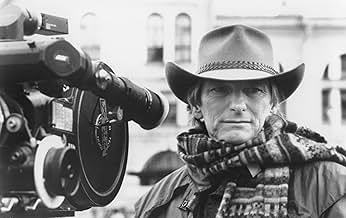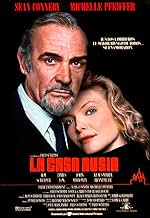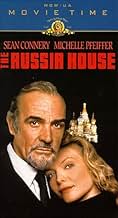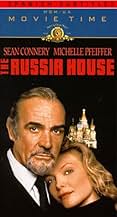VALUTAZIONE IMDb
6,1/10
19.074
LA TUA VALUTAZIONE
Un editore britannico espatriato si ritrova inaspettatamente a lavorare per i servizi segreti britannici per indagare sulle persone in Russia.Un editore britannico espatriato si ritrova inaspettatamente a lavorare per i servizi segreti britannici per indagare sulle persone in Russia.Un editore britannico espatriato si ritrova inaspettatamente a lavorare per i servizi segreti britannici per indagare sulle persone in Russia.
- Regia
- Sceneggiatura
- Star
- Premi
- 1 vittoria e 5 candidature totali
Ian McNeice
- Merrydew
- (as Ian McNiece)
Peter Marinker
- U.S. Scientist
- (as Peter Mariner)
Recensioni in evidenza
The Russia House
I must confess, this is easily my favourite film. I have watched only a handful of films more than once. This film I have watched at least twenty times but by the time you read this it will be many more since I watch it at least every 6 weeks or so. I sit down with a bottle of genuine Russian vodka, a small tin of red caviar and some hard white bread, I turn up the dolby 5.1 and soak up the experience. Why is this film so good? Well for a start it is from a book by John LeCarre who must be our best living author. Who else researches a book so thoroughly? Every location has been checked, every character totally believable, with an intelligent plot.
Secondly the screenplay by Tom Stoppard is faultless. Having read the book first, I could not believe how faithfully Stoppard made his screenplay- chunks of LeCarre dialogue are faithfully copied. Then there is the acting. There are memorable performances from Sean Connery (Barley) and Michel Pfeiffer(Katya), the beautiful Russian heroine. Klaus Maria Brandauer wins my "best supporting actor" award as the totally believable Russian scientist. There are so many memorable lines of dialogue in this film. Brandauers line "If I will be a hero, will you act like a merely decent human being" always brings a lump to my throat. Barley's tongue in cheek replies to his CIA interrogators are wonderful. What gives this film such a feeling of authenticity are the locations which are all genuine Moscow and St Petersburg. Already Moscow has changed a lot since this film was made. The lovely old National hotel shown in the film has been demolished and replaced with a modern nonentity, so this film is rapidly becoming a piece of history. The buildings are changing but the same faceless KGB operators are still there. How can one flawed man fight the power of the spymasters. Barley shows how to do it. What a hero! Does it have any faults?If only Ken Russell had stuck to directing and left acting to actors.
I must confess, this is easily my favourite film. I have watched only a handful of films more than once. This film I have watched at least twenty times but by the time you read this it will be many more since I watch it at least every 6 weeks or so. I sit down with a bottle of genuine Russian vodka, a small tin of red caviar and some hard white bread, I turn up the dolby 5.1 and soak up the experience. Why is this film so good? Well for a start it is from a book by John LeCarre who must be our best living author. Who else researches a book so thoroughly? Every location has been checked, every character totally believable, with an intelligent plot.
Secondly the screenplay by Tom Stoppard is faultless. Having read the book first, I could not believe how faithfully Stoppard made his screenplay- chunks of LeCarre dialogue are faithfully copied. Then there is the acting. There are memorable performances from Sean Connery (Barley) and Michel Pfeiffer(Katya), the beautiful Russian heroine. Klaus Maria Brandauer wins my "best supporting actor" award as the totally believable Russian scientist. There are so many memorable lines of dialogue in this film. Brandauers line "If I will be a hero, will you act like a merely decent human being" always brings a lump to my throat. Barley's tongue in cheek replies to his CIA interrogators are wonderful. What gives this film such a feeling of authenticity are the locations which are all genuine Moscow and St Petersburg. Already Moscow has changed a lot since this film was made. The lovely old National hotel shown in the film has been demolished and replaced with a modern nonentity, so this film is rapidly becoming a piece of history. The buildings are changing but the same faceless KGB operators are still there. How can one flawed man fight the power of the spymasters. Barley shows how to do it. What a hero! Does it have any faults?If only Ken Russell had stuck to directing and left acting to actors.
My first comment for this site....exciting stuff.
Prompted to write this by seeing this again on video - the third time for me, and it's rare that I want to see anything three times. And I realized that it's fascination still holds....this is one of my top 10, definitely.
The reasons I would rate this a "9", while somebody else would give it a "5.9" are largely personal....i think it always comes down to the personal. Talk all we want, when we watch a movie - as when we eat a meal, or kiss someone - the pleasure center in the brain either lights up or doesn't. For me it's all about the love of a place...for Scott Barley Blair it's early Glastnost Russia, for me it's 90's Germany - Hamburg, Berlin...the strangeness, the trueness of people who surround you in such a place and your love for them because of this. The fact that a film can light up specific sense memories like these means that it is true - at least in that respect. This is a remarkably honest film - terrifically unsensational for a spy film and one of the rare "love stories" that delivers the satisfactions expected of a "love story" without getting mawkish. Everything rings true here except for the ending (a fabricated "happy ending" which is the only thing that kept me from rating this a 10).
To ask for Manchurian Candidate type excitement from this low key film is wrong. The suspense, which is remarkably sustained (those rich long tracking shots of people walking through public places to uncertain destinations to meet with, or maybe not meet with shadow characters who may be allies or enemies) is the truer suspense of the uncertainty of living in a gray, gray world...where nothing much happens, but peril is part of the fabric of mundane life.
(Those sequences are gorgeous....the colors of autumn in a Leningrad park, the closeups of the stone gargoyles....the moody circular stepping pace of the soundtrack....Branford Marsalis' saxophone.) Someone has said here that it is talky. Yes, it is talky...but the talk is brilliant...it is the perfect reflection of a world where everyone - book publishers and bureaucrats and spies alike speaks in mannered, ritualized streams of code. This is not disinformation - it is perfectly understood by all, a language that has supplanted the language of an earlier age in which sincerity was an option.
Besides that ending, the piece is perfectly faithful to LeCarre's novel. LeCarre's books have had good luck when being translated into movies. Of the eight or so that have been adapted, four have made great films: The Spy Who Came into the Cold, The Russia House, and the two George Smiley BBC miniseries. LeCarre is a great writer and more specifically great at plotting and dialogue, and these films all succeed pretty much by filming what is written unadorned and pouring on the atmosphere. And they are blessed with lead performances by three great actors at the top of the form - Richard Burton, Sean Connery and Alec Guiness (Guiness especially...to watch him for six hours in Smiley's People is one of the great pleasures).
A beautifully efficient and elegant translation by Tom Stoppard of a great novel, wonderfully dignified and touching performances by Connery and Michelle Pfeiffer (never seen her better), a beautiful soundtrack by a second tier composer graced by the presence of a real jazz master, a terrific evocation of a place and time....a very moving film.
Prompted to write this by seeing this again on video - the third time for me, and it's rare that I want to see anything three times. And I realized that it's fascination still holds....this is one of my top 10, definitely.
The reasons I would rate this a "9", while somebody else would give it a "5.9" are largely personal....i think it always comes down to the personal. Talk all we want, when we watch a movie - as when we eat a meal, or kiss someone - the pleasure center in the brain either lights up or doesn't. For me it's all about the love of a place...for Scott Barley Blair it's early Glastnost Russia, for me it's 90's Germany - Hamburg, Berlin...the strangeness, the trueness of people who surround you in such a place and your love for them because of this. The fact that a film can light up specific sense memories like these means that it is true - at least in that respect. This is a remarkably honest film - terrifically unsensational for a spy film and one of the rare "love stories" that delivers the satisfactions expected of a "love story" without getting mawkish. Everything rings true here except for the ending (a fabricated "happy ending" which is the only thing that kept me from rating this a 10).
To ask for Manchurian Candidate type excitement from this low key film is wrong. The suspense, which is remarkably sustained (those rich long tracking shots of people walking through public places to uncertain destinations to meet with, or maybe not meet with shadow characters who may be allies or enemies) is the truer suspense of the uncertainty of living in a gray, gray world...where nothing much happens, but peril is part of the fabric of mundane life.
(Those sequences are gorgeous....the colors of autumn in a Leningrad park, the closeups of the stone gargoyles....the moody circular stepping pace of the soundtrack....Branford Marsalis' saxophone.) Someone has said here that it is talky. Yes, it is talky...but the talk is brilliant...it is the perfect reflection of a world where everyone - book publishers and bureaucrats and spies alike speaks in mannered, ritualized streams of code. This is not disinformation - it is perfectly understood by all, a language that has supplanted the language of an earlier age in which sincerity was an option.
Besides that ending, the piece is perfectly faithful to LeCarre's novel. LeCarre's books have had good luck when being translated into movies. Of the eight or so that have been adapted, four have made great films: The Spy Who Came into the Cold, The Russia House, and the two George Smiley BBC miniseries. LeCarre is a great writer and more specifically great at plotting and dialogue, and these films all succeed pretty much by filming what is written unadorned and pouring on the atmosphere. And they are blessed with lead performances by three great actors at the top of the form - Richard Burton, Sean Connery and Alec Guiness (Guiness especially...to watch him for six hours in Smiley's People is one of the great pleasures).
A beautifully efficient and elegant translation by Tom Stoppard of a great novel, wonderfully dignified and touching performances by Connery and Michelle Pfeiffer (never seen her better), a beautiful soundtrack by a second tier composer graced by the presence of a real jazz master, a terrific evocation of a place and time....a very moving film.
The Russia House is a superior spy romance movie which falls short of being great. Additionally a couple of factors have been unkind to it over time.
Connery and Pfeiffer are excellant; the large cast are almost uniformly outstanding (except perhaps Roy Scheider, who I usually like, but who seems a bit over the top in his role here); the Moscow scenery and end of the Cold War feel are great, and the main characters are easy to like, if difficult to outright love. On the down side the writing assumes too much in expecting the audience to stay on top of the espionage jargon and intrigue, added to the non-linear plot. Let your attention wander and you'll lose your way. If it had been a little easier to follow, it would have left more room for dramatic tension, which was adequate but seldom riveting.
When I said that time has been unkind to The Russia House, I meant two things: firstly that the unfortunate timing of the movie's release, a year before the collapse of the Soviet Union, ensured that it would be dated almost immediately. More significantly, a growing portion of the film's potential audience didn't live through the late Soviet Era, and the nuances of concepts like Glasnost, and why Perestroika makes it hard for Pfeiffer to do her shoe-shopping aren't going to mean a thing to anyone much under 30.
But that's not the movie's fault. Russia House is still a quality, enjoyable drama with a great cast, even if it's somewhat ponderous and slow-moving, and complex. And oh yes - it has James Fox. A film like this without James Fox would have been like a table with three legs.
7 out of 10
Connery and Pfeiffer are excellant; the large cast are almost uniformly outstanding (except perhaps Roy Scheider, who I usually like, but who seems a bit over the top in his role here); the Moscow scenery and end of the Cold War feel are great, and the main characters are easy to like, if difficult to outright love. On the down side the writing assumes too much in expecting the audience to stay on top of the espionage jargon and intrigue, added to the non-linear plot. Let your attention wander and you'll lose your way. If it had been a little easier to follow, it would have left more room for dramatic tension, which was adequate but seldom riveting.
When I said that time has been unkind to The Russia House, I meant two things: firstly that the unfortunate timing of the movie's release, a year before the collapse of the Soviet Union, ensured that it would be dated almost immediately. More significantly, a growing portion of the film's potential audience didn't live through the late Soviet Era, and the nuances of concepts like Glasnost, and why Perestroika makes it hard for Pfeiffer to do her shoe-shopping aren't going to mean a thing to anyone much under 30.
But that's not the movie's fault. Russia House is still a quality, enjoyable drama with a great cast, even if it's somewhat ponderous and slow-moving, and complex. And oh yes - it has James Fox. A film like this without James Fox would have been like a table with three legs.
7 out of 10
Lights Up the Screen. Much better after a 2nd or 5th time viewing ! Volume On High
First Saw 30 years ago. Aging well The Movie Stars Shine
Films that require you to pay close attention to every little detail and have a complex plot from the outset can generally be thrust into one of two categories: Stimulating and intellectual, or potential insomnia cures. The Russia House is the former... so keep taking the Nytol. There's much languid talk about politics, international trade, the Cold War, espionage... and for those expecting Sean Connery to slap on a tux and start blowing people away, and going to be sorely disappointed. If on the other hand, you LISTEN to what is being said and are open to the idea of getting small rewards along the way rather than shallow exhibitionism, than this may be right up your street.
Make sure all the windows are closed, the children are in bed, your bladder is empty... because you don't want any meaningless distractions while the story is being told. Not that it moves at a fast pace, but inconsequential moments have repercussions for later on, and simple snatches of dialogue could hold invaluable clues. Russia's never looked better, and the chief photographer captures Moscow in all it's architectural splendour. The much missed Connery (He's retired from acting now, believe it or not) does a sterling job as the amateur spy who doesn't know what side he's on, and sex-on-legs Pfeiffer has a dead-on Russian accent. At least to this untrained ear.
Maybe not for action junkies, but anyone else who appreciates much subtler qualities in film... Please step this way. 7/10
Make sure all the windows are closed, the children are in bed, your bladder is empty... because you don't want any meaningless distractions while the story is being told. Not that it moves at a fast pace, but inconsequential moments have repercussions for later on, and simple snatches of dialogue could hold invaluable clues. Russia's never looked better, and the chief photographer captures Moscow in all it's architectural splendour. The much missed Connery (He's retired from acting now, believe it or not) does a sterling job as the amateur spy who doesn't know what side he's on, and sex-on-legs Pfeiffer has a dead-on Russian accent. At least to this untrained ear.
Maybe not for action junkies, but anyone else who appreciates much subtler qualities in film... Please step this way. 7/10
Lo sapevi?
- QuizThe meaning and relevance of the title "The Russia House" is that it refers to the nickname given to the section of the British Secret Service that was assigned to investigating the Soviet Union.
- BlooperDuring Blair's "start the avalanche" speech, Dante is seen at the end of the table. As the camera pans around the table during the speech, Dante disappears from the end of the table, and then reappears.
- Curiosità sui creditiThe credits appear over a series of clips showing location shots from the film, concluding with a repeat of the final scene.
- ConnessioniFeatured in A Tribute to Sean Connery (1990)
I più visti
Accedi per valutare e creare un elenco di titoli salvati per ottenere consigli personalizzati
Dettagli
- Data di uscita
- Paese di origine
- Sito ufficiale
- Lingue
- Celebre anche come
- The Russia House
- Luoghi delle riprese
- Lisbona, Portogallo(on location)
- Aziende produttrici
- Vedi altri crediti dell’azienda su IMDbPro
Botteghino
- Budget
- 21.800.000 USD (previsto)
- Lordo Stati Uniti e Canada
- 22.997.992 USD
- Fine settimana di apertura Stati Uniti e Canada
- 4.435.650 USD
- 25 dic 1990
- Lordo in tutto il mondo
- 22.997.992 USD
Contribuisci a questa pagina
Suggerisci una modifica o aggiungi i contenuti mancanti

Divario superiore
By what name was La casa Russia (1990) officially released in India in Hindi?
Rispondi





































